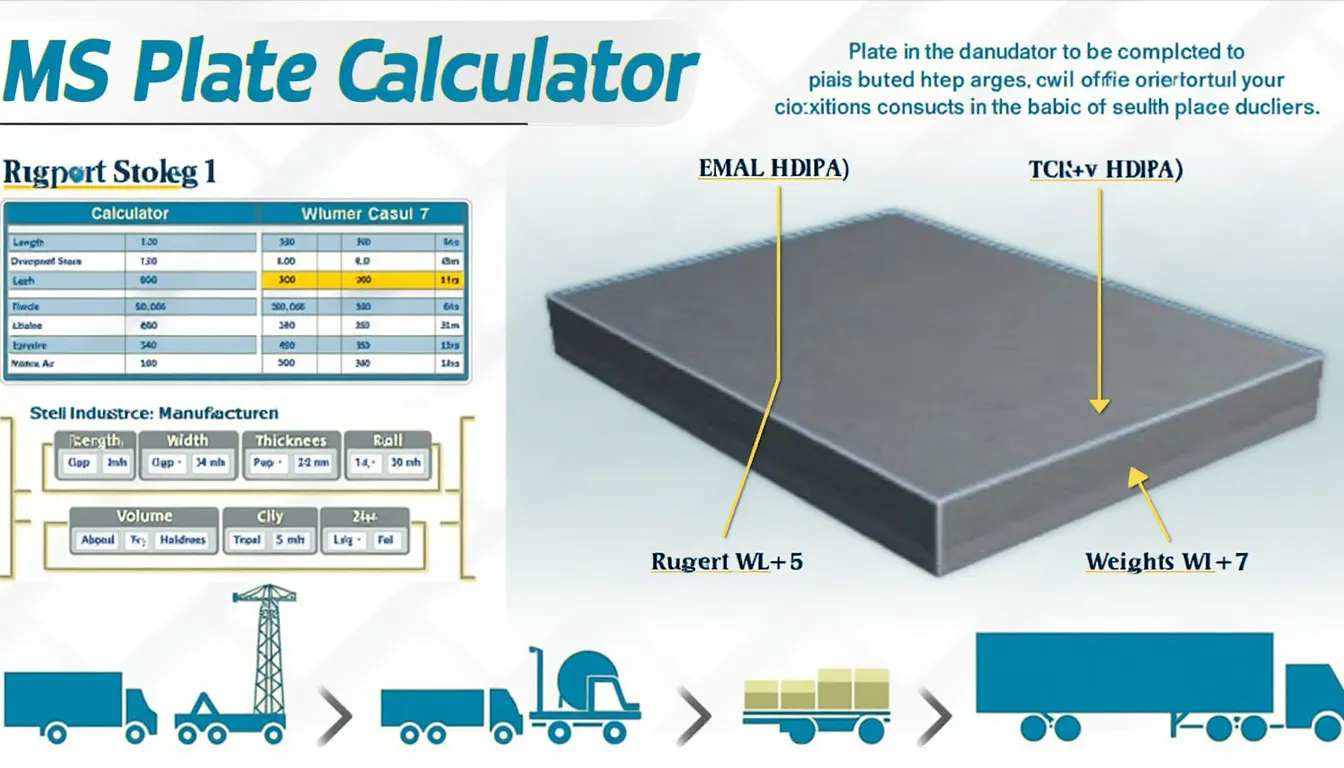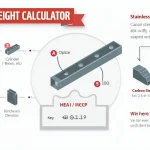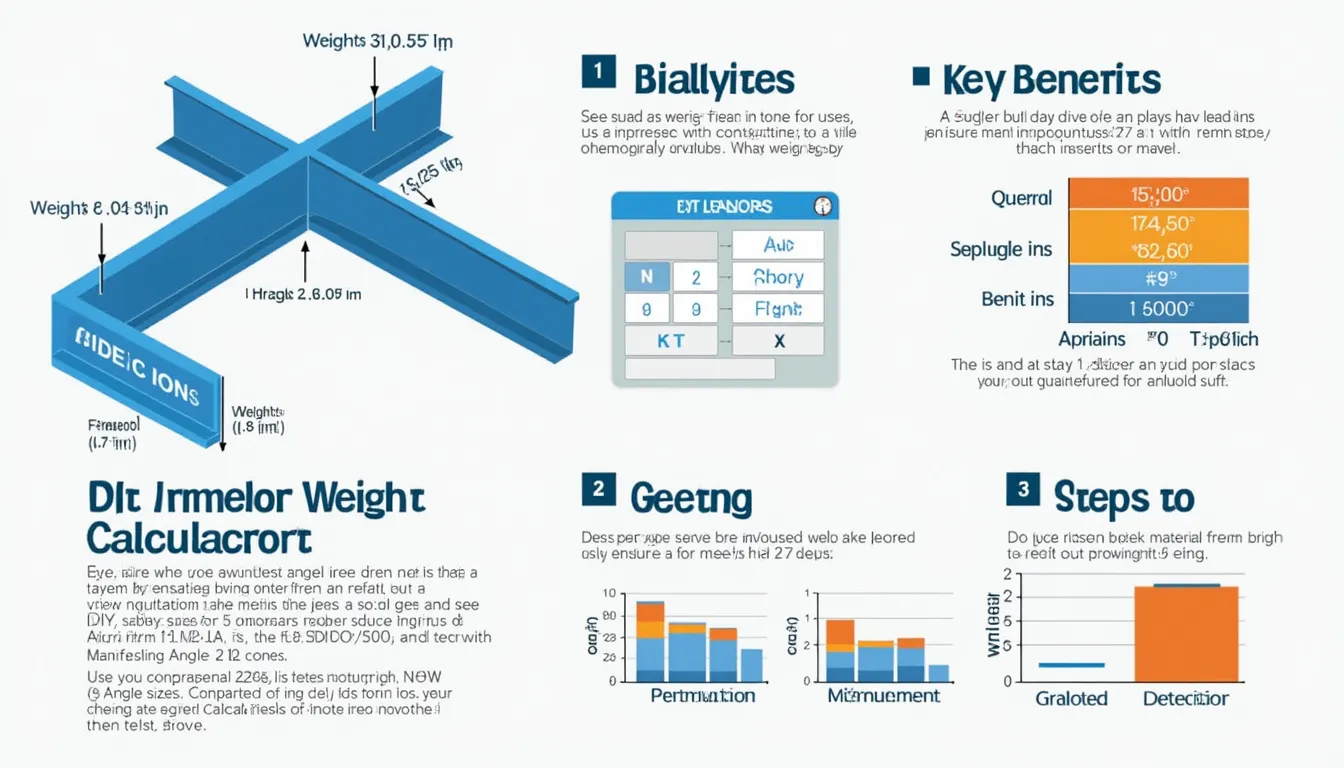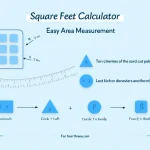MS Plate Weight Calculator
Is this tool helpful?
How to Use the MS Plate Weight Calculator Effectively
The MS Plate Weight Calculator is a user-friendly tool designed to help you quickly and accurately determine the weight of mild steel plates. Follow these simple steps to use the calculator effectively:
- Enter the Length: Input the length of your MS plate in the first field. For example, you might enter “1000” if your plate is 1000 mm long.
- Select Length Unit: Choose the appropriate unit for the length from the dropdown menu. Options include mm, cm, m, inches, and feet.
- Enter the Width: Input the width of your MS plate in the second field. For instance, you could enter “500” for a plate that’s 500 mm wide.
- Select Width Unit: Choose the unit for the width, just as you did for the length.
- Enter the Thickness: Input the thickness of your MS plate in the third field. A common thickness might be “10” for a 10 mm thick plate.
- Select Thickness Unit: Choose the unit for the thickness from the dropdown menu.
- Calculate: Click the “Calculate Weight” button to get your results.
The calculator will then display the weight of your MS plate in both kilograms (kg) and pounds (lbs), providing you with versatile measurements for various applications.
Understanding the MS Plate Weight Calculator: Definition, Purpose, and Benefits
The MS Plate Weight Calculator is an essential online tool for professionals and enthusiasts in the fields of engineering, construction, and metalworking. This calculator is specifically designed to determine the weight of mild steel (MS) plates based on their dimensions.
Definition and Purpose
Mild steel, also known as low-carbon steel, is a widely used material in various industries due to its strength, durability, and cost-effectiveness. The MS Plate Weight Calculator serves the crucial purpose of quickly and accurately estimating the weight of mild steel plates, which is vital for numerous applications, including:
- Structural engineering calculations
- Material cost estimation
- Transportation and logistics planning
- Inventory management
- Fabrication and manufacturing processes
Key Benefits
Using the MS Plate Weight Calculator offers several advantages:
- Time-saving: Eliminates the need for manual calculations, significantly reducing the time required to determine plate weights.
- Accuracy: Minimizes human error in calculations, ensuring precise weight estimations.
- Versatility: Accommodates various units of measurement, making it useful for professionals working with different systems.
- Accessibility: Available online, allowing users to perform calculations anytime and anywhere.
- Cost-effective: Helps in accurate material estimation, potentially reducing waste and optimizing costs in projects.
The Science Behind the MS Plate Weight Calculator
To understand how the MS Plate Weight Calculator works, it’s essential to delve into the underlying principles and formulas used in the calculations.
Density of Mild Steel
The foundation of the weight calculation is the density of mild steel. Mild steel has a standard density of 7850 kg/m³. This constant value is crucial in determining the weight of any mild steel object, including plates.
Volume Calculation
The first step in calculating the weight of an MS plate is to determine its volume. The volume of a rectangular plate is calculated using the formula:
$$V = L \times W \times T$$Where:
- V = Volume (in cubic meters, m³)
- L = Length (in meters, m)
- W = Width (in meters, m)
- T = Thickness (in meters, m)
Weight Calculation
Once we have the volume, we can calculate the weight using the density of mild steel:
$$W = V \times \rho$$Where:
- W = Weight (in kilograms, kg)
- V = Volume (in cubic meters, m³)
- ρ (rho) = Density of mild steel (7850 kg/m³)
Unit Conversions
The calculator handles various input units and converts them to meters for consistent calculations. Here are the conversion factors used:
- 1 m = 1000 mm
- 1 m = 100 cm
- 1 m = 39.3701 inches
- 1 m = 3.28084 feet
For the final output, the calculator also provides the weight in pounds (lbs) using the conversion factor:
- 1 kg = 2.20462 lbs
Practical Applications of the MS Plate Weight Calculator
The MS Plate Weight Calculator finds applications across various industries and scenarios. Let’s explore some practical use cases:
1. Construction Industry
In construction projects, accurately estimating the weight of steel plates is crucial for:
- Structural load calculations
- Determining foundation requirements
- Selecting appropriate lifting and handling equipment
Example: An architect is designing a steel-framed building and needs to calculate the weight of the steel plates used for the floor. Using the calculator, they input the following dimensions:
- Length: 6 m
- Width: 3 m
- Thickness: 15 mm
The calculator would return a weight of approximately 2,119.5 kg or 4,672.5 lbs. This information helps the architect in structural calculations and in determining the load-bearing capacity of the building’s support structures.
2. Manufacturing and Fabrication
Manufacturers and fabricators use the MS Plate Weight Calculator for:
- Material requirement planning
- Cost estimation for quotes and bids
- Inventory management
Example: A metal fabrication shop receives an order for custom steel plates. They need to cut 50 plates with the following dimensions:
- Length: 1200 mm
- Width: 600 mm
- Thickness: 8 mm
Using the calculator, they find that each plate weighs approximately 45.22 kg or 99.69 lbs. This allows them to accurately estimate the total material weight (2,261 kg or 4,984.5 lbs) for ordering supplies and pricing the job.
3. Transportation and Logistics
The calculator is invaluable in the transportation sector for:
- Load planning for trucks and containers
- Determining shipping costs
- Ensuring compliance with weight restrictions
Example: A logistics company needs to transport a large MS plate with the following dimensions:
- Length: 16 feet
- Width: 8 feet
- Thickness: 1 inch
Using the calculator, they determine that the plate weighs approximately 3,175.15 kg or 7,000.13 lbs. This information helps them select the appropriate vehicle and plan the route considering weight restrictions on roads and bridges.
4. Engineering and Design
Engineers and designers utilize the MS Plate Weight Calculator for:
- Prototype development
- Stress analysis
- Material selection
Example: An engineer is designing a new type of industrial machinery that requires a steel base plate. They’re considering two options:
- Length: 2 m
- Width: 1.5 m
- Thickness: 25 mm
- Length: 2.2 m
- Width: 1.4 m
- Thickness: 20 mm
Using the calculator, they find that Option 1 weighs 588.75 kg (1,297.85 lbs), while Option 2 weighs 481.04 kg (1,060.43 lbs). This information helps them make an informed decision based on weight requirements and other design factors.
Enhancing Efficiency with the MS Plate Weight Calculator
The MS Plate Weight Calculator significantly improves efficiency in various workflows:
1. Streamlined Material Ordering
By providing accurate weight estimates, the calculator helps in ordering the right amount of material, reducing waste and minimizing excess inventory.
2. Improved Project Planning
Accurate weight calculations allow for better planning of equipment needs, workforce allocation, and project timelines.
3. Enhanced Safety Measures
Knowing the exact weight of steel plates helps in implementing appropriate safety measures during handling and installation processes.
4. Cost Optimization
Precise weight calculations lead to more accurate cost estimations, helping businesses price their products and services competitively.
5. Time Savings
The calculator eliminates the need for manual calculations, saving valuable time that can be allocated to other critical tasks.
Frequently Asked Questions (FAQ)
Q1: Why is the density of mild steel important in this calculator?
A1: The density of mild steel (7850 kg/m³) is a crucial constant in the weight calculation. It represents the mass per unit volume of the material and is essential for converting the plate’s volume into its weight.
Q2: Can this calculator be used for materials other than mild steel?
A2: This specific calculator is designed for mild steel plates. Using it for other materials would result in inaccurate calculations as different materials have different densities.
Q3: How does the calculator handle different units of measurement?
A3: The calculator includes built-in conversion factors to handle various units (mm, cm, m, inches, feet). It converts all inputs to a standard unit (meters) before performing the calculation, ensuring consistency and accuracy.
Q4: Is there a maximum size limit for the plates that can be calculated?
A4: The calculator can handle a wide range of dimensions. However, for extremely large plates, it’s always good to double-check the results with manual calculations or consult with a structural engineer.
Q5: How can I use this calculator for estimating shipping costs?
A5: Once you have the weight of the plate, you can use this information to get shipping quotes from various carriers. Many shipping companies base their rates on weight and dimensions, so having accurate weight information is crucial for cost estimation.
Q6: Can the calculator be used for non-rectangular plates?
A6: This calculator is specifically designed for rectangular plates. For non-rectangular shapes, you would need to calculate the volume differently before applying the density formula.
Q7: How often is the density value for mild steel updated in the calculator?
A7: The density of mild steel (7850 kg/m³) is a standard value that doesn’t change frequently. However, it’s always good to verify this value with current industry standards for the most accurate calculations.
Q8: Can I use this calculator for steel grades other than mild steel?
A8: While the calculator is optimized for mild steel, it can provide a close approximation for other steel grades with similar densities. However, for precise calculations with other steel grades, it’s best to use their specific density values.
Q9: How does the thickness of the plate affect its weight?
A9: The thickness of the plate has a direct linear relationship with its weight. Doubling the thickness will double the weight, assuming the length and width remain constant.
Q10: Is there a mobile app version of this calculator available?
A10: Currently, this is a web-based calculator. However, its responsive design makes it easily accessible and usable on mobile devices through web browsers.
Conclusion: Empowering Precision in Steel Plate Weight Calculations
The MS Plate Weight Calculator stands as an indispensable tool in the arsenal of professionals across various industries. By providing quick, accurate, and reliable weight estimations for mild steel plates, it streamlines processes, enhances decision-making, and contributes to more efficient project planning and execution.
From construction sites to manufacturing floors, from logistics planning to engineering designs, this calculator proves its worth time and again. Its user-friendly interface, coupled with its ability to handle multiple units of measurement, makes it accessible to a wide range of users, from seasoned engineers to DIY enthusiasts.
As we continue to advance in the realms of construction, manufacturing, and engineering, tools like the MS Plate Weight Calculator play a crucial role in bridging the gap between theoretical knowledge and practical application. They empower professionals to make informed decisions, optimize resources, and push the boundaries of what’s possible in their respective fields.
Whether you’re estimating material costs for a large-scale construction project, planning the logistics for transporting heavy steel plates, or simply calculating the weight of a custom-fabricated steel component, this calculator proves to be an invaluable asset. It not only saves time and reduces the likelihood of human error but also contributes to more sustainable practices by enabling precise material estimation and reducing waste.
In conclusion, the MS Plate Weight Calculator is more than just a simple calculation tool. It’s a testament to how technology can simplify complex tasks, enhance productivity, and drive innovation across industries. By incorporating this tool into your workflow, you’re not just calculating weights – you’re optimizing processes, improving accuracy, and ultimately, contributing to the advancement of your field.
Important Disclaimer
The calculations, results, and content provided by our tools are not guaranteed to be accurate, complete, or reliable. Users are responsible for verifying and interpreting the results. Our content and tools may contain errors, biases, or inconsistencies. We reserve the right to save inputs and outputs from our tools for the purposes of error debugging, bias identification, and performance improvement. External companies providing AI models used in our tools may also save and process data in accordance with their own policies. By using our tools, you consent to this data collection and processing. We reserve the right to limit the usage of our tools based on current usability factors. By using our tools, you acknowledge that you have read, understood, and agreed to this disclaimer. You accept the inherent risks and limitations associated with the use of our tools and services.







